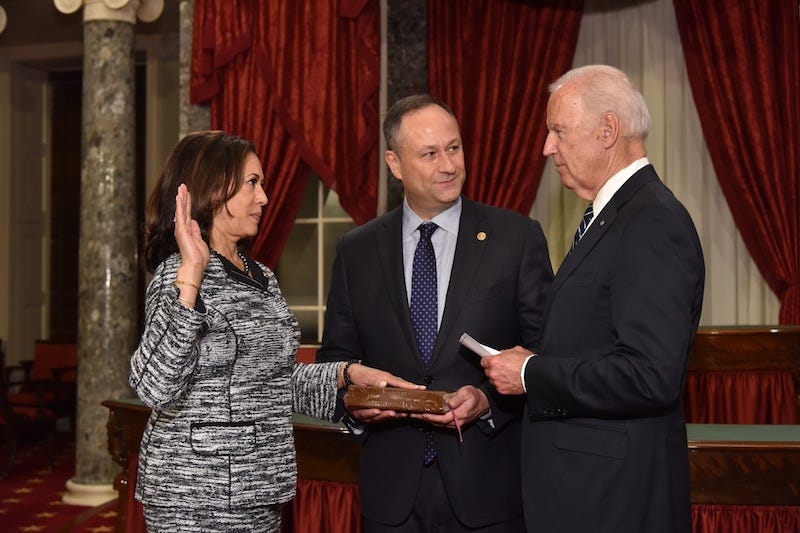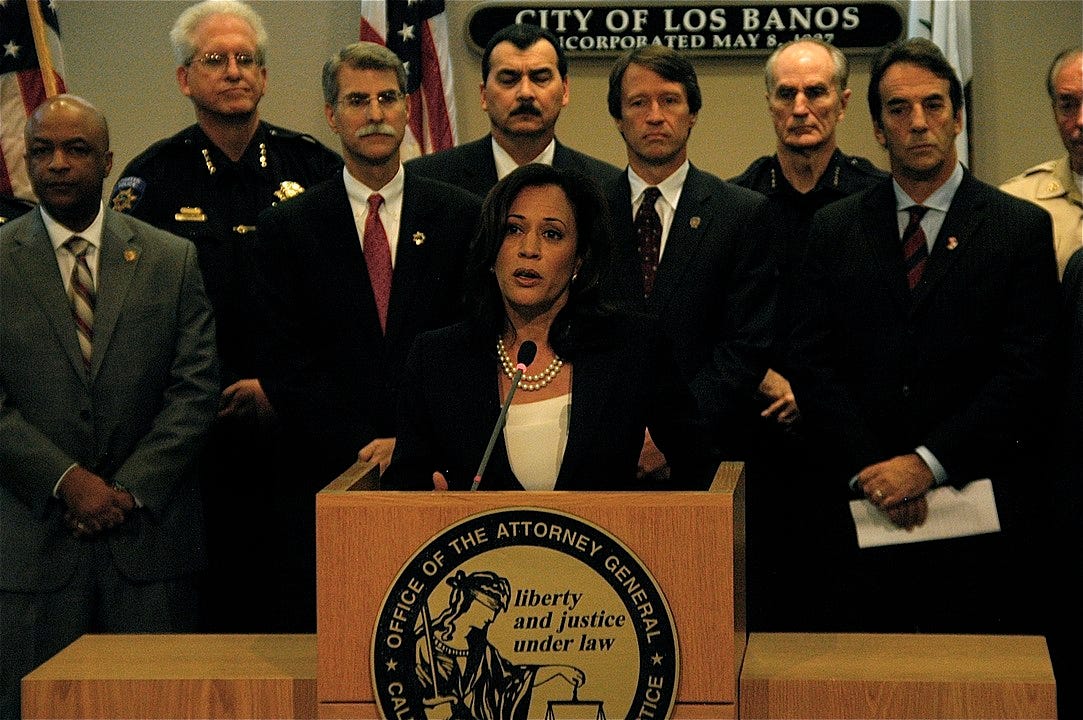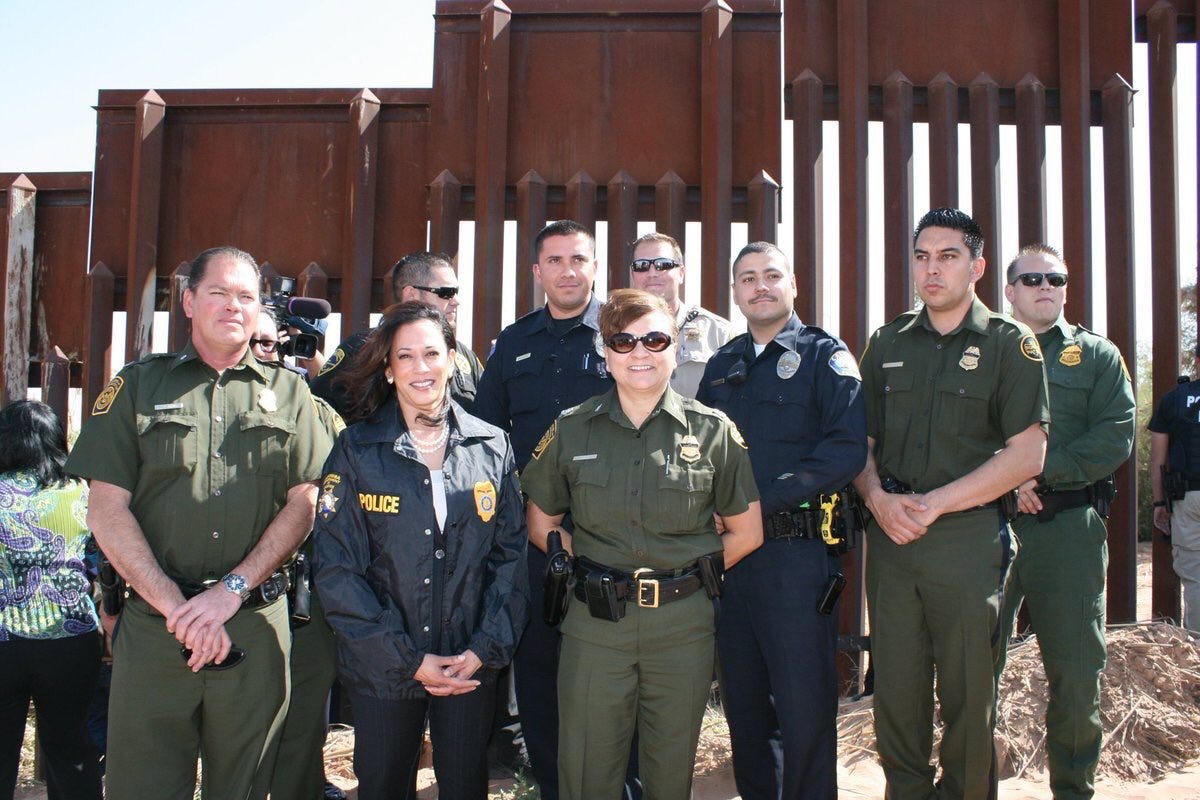
I propose a brief break from the horror of war in the Middle East to change the subject to politics. No, not the pandemonium in the House of Representatives, which at this writing is still seeking a speaker and deserves all the negative ink it’s been getting. Nor Trump’s legal woes too numerous to count. During the last few weeks, I’ve been fascinated by what I think is an undercovered story concerning the presidential campaign. In a word: what’s the matter with Kamala Harris (a.k.a. Nikki Haley’s favorite punching bag).
This is not to disparage the first Black/Asian vice president and the first woman to be elected on a national ticket. If you examine Harris’ record of accomplishment as an elected official, she clearly earned the right to be considered as Joe Biden’s running-mate when he selected her in 2020. But was it the right pick?
It is rather shocking that her approval ratings are even lower than those of her boss. As of about a week ago, the 538 polling average had her disapproval ratings at nearly 55%, up from about 37% at the beginning of 2022 — a rise of some 17.5 percentage points. During that time, Biden’s rose from 30% to 54%. This is a strange progression. Is Harris’ lack of popularity simply a reflection of her boss’ poor standing in the polls or is something else going on?
As if right on cue, New York Times Magazine national politics writer Astead Herndon wrote an extensive piece for his paper’s magazine last week, headlined “In Search of Kamala Harris” (free link) in which he attempted, among other things, to answer some of the question and concerns we share. Herndon covered Harris’ brief presidential campaign in 2019 and conducted 75 interviews for this article.
I don’t know how long the piece actually is but the audio version lasts more than 53 minutes. If you want the Cliff’s Notes version, take a look at David Leonhart’s impartial take in his morning newsletter of Oct. 12.

Having been elected as San Francisco DA, state attorney general and the U.S. Senate, Harris was viewed by many as a rising star of the party. My take has always been that, notwithstanding her electoral success in her home state, Harris simply is not a good enough politician to shine brightly on the national stage.
For expressing this less-than-flattering view of Harris on Twitter and Threads a few weeks ago, I was attacked aggressively. I posited that the veep and Biden did not know each other very well, they never bonded and for whatever reason their partnership hasn’t worked out, and that maybe Harris just wasn’t a highly skilled politician to begin with.
Democratic operatives, along with followers of an account describing itself as an unofficial rapid-response social-media team for Harris, came after me with everything including the kitchen sink. I was sexist, racist or at best, an ignorant yokel from outside California or the DC Beltway. And those were the nice accusations. I cannot locate those accounts anymore because eventually I had to block them. Who knows? Maybe they’ll discover this column and charge at me again.
These are the obstacles commentators face when discussing Harris and any shortcomings — real or imagined — that she might have. We walk on eggshells in even broaching the subject. Herndon’s piece helped me put my finger on why Harris seems ill-suited for the job and therefore a liability in 2024.
As Herndon acknowledges, some of the criticism directed at Harris no doubt does spring from either racism, sexism or both. Interestingly, though, some of the fault-finding springs from criminal justice reform advocates on the left. As DA, Harris jailed marijuana offenders, Herndon noted, leading to “a meme that depicted Harris handcuffing a child, a viral interview where she laughed about smoking marijuana and … [an official] photo in which Harris donned a police jacket during her time as California’s attorney general.”

Meanwhile, since the murder of George Floyd at the hands of Minneapolis police in 2020, a stronger desire has grown in the Democratic Party for criminal justice reform — a development that contrasts with Harris’ previously cultivated public image. So one could make the case that Harris flip-flopped for the sake of political convenience, though she’s hardly the first politician to do that.
For a politician with a long voting record on other matters, that apparent change of heart wouldn’t be fatal, but when she ran for president in 2019, Harris had only been a Senator for a little more than two years. Aside from interrogating now-Supreme Court Justice Brett Kavanaugh during his confirmation hearing in 2018, Harris did not have much of a record to point to except for her time as a city and state prosecutor. So she was quite rightly defined by her time in law enforcement.
Compounding the problem is that prosecutors, even if elected as Harris was, do not typically have to lay out a broad vision for the future of the country or their state. They’re focused on crime, law enforcement and the criminal justice system. As Leonhart wrote, “Harris still struggles with what George H.W. Bush — one of her predecessors in the vice presidency — once inartfully called “the vision thing.” But unlike Harris, the elder Bush had, as the Washington Post put it, a long record of “competence and restraint” to fall back on.
And there is this:
When Astead asked her to talk about her vision for American society, she showed little interest. “I think you have to be more specific,” Harris replied at one point, “because I’m not really into labels.”
That should be a question anyone who aspires to be president could hit out of the park. As my friend Paul Pacelli responded earlier this week when I appeared on his radio show on WICC 600 to talk about Harris, we are reminded of that fatally awkward moment in 1980 when Ted Kennedy momentarily froze, then rambled absently when asked by Roger Mudd of CBS News why he wanted to be president. Teddy did his best impression of Ralph Kramden: “Homina, homina …”.
It also appears that Biden and Harris weren’t well acquainted when she was selected as his running mate, though they evidently knew each other when Harris and Biden’s late son Beau were both state attorneys general, the latter in Delaware.
But that kind of goodwill only takes you so far. Harris stopped just short of calling Biden a racist for opposing federal mandates for busing school children to achieve integration. Obviously, the relationship is less-than-ideal. Again, Harris wouldn’t be the first veep to be in the position of serving a president she did not exactly love or know well (Harry Truman, Lyndon Johnson and Dan Quayle come to mind), but it’s yet one more liability weighting her down.
I agree with Leonhart that part of the problem is that the office of the vice president is itself a thankless job — ask FDR’s veep, John Nance Garner, who said it’s "not worth a bucket of warm piss."
Veeps are often the butt of jokes for their roles as subservient second fiddles. Who could forget the otherwise forgettable Quayle, who insisted that “potatoe” was the correct spelling of America’s favorite vegetable?
Harris has something else in common with Quayle. Her responses to questions sometimes resemble a word salad. Indeed, they have become a favorite talking point for right-wing media. But it’s even worse if, like Quayle and Harris, you’re not a very good politician to begin with — and if the president you serve is in his 80s.




It's distressing to hear you report taking major fire from Harris votaries for writing an honest analysis of her record, skills, and prospects. Way on the other side of the aisle, Jim Jordan's attack mutts are deploying not dissimilar attack tactics against House caucus members with the spine to question his suitability for speaker. We're not going to get off this paralyzed dime until we stop screaming at each other.
For bad relations between a vp and president, look at John C Calhoun and JQ Adams. Calhoun quit and ran as VP against Adams in the next election (winning with Andrew Jackson)